As the outbreak of Mpox continues to pose a serious health threat across Africa, the AIDS Healthcare Foundation (AHF) Nigeria has called for urgent global action to address vaccine inequity, which it said is severely hampering the continent’s ability to respond effectively.
The AIDS Healthcare Foundation (AHF) has been at the forefront of advocacy efforts, pushing for a pandemic agreement that ensures fair access to vaccines and treatments for developing nations.
In a press release sent to LEADERSHIP, the Foundation raised concerns that the current response to the Mpox outbreak mirrors the inequalities witnessed during the COVID-19 pandemic.
In the statement AHF Nigeria, Country Program Director (CPD) Dr. Echey Ijezie said Africa’s severe Mpox outbreak, driven primarily by the new clade Ib variant, is particularly deadly for children and has impacted at least 13 African countries, with more than 22,800 confirmed cases and more than 620 deaths reported this year.
“The Democratic Republic of the Congo has endured the brunt, accounting for 96% of cases and 97% of deaths. “We started our push for equity during the COVID-19 pandemic, where we saw the devastating impact of vaccine hoarding on African nations. Now, we are seeing similar challenges play out with Mpox.
“The World Health Organization (WHO) declared Mpox a global health emergency on 14th August 2024. However, despite the availability of vaccines, Africa continues to struggle with access due to high costs and limited supply. Bavarian Nordic, the maker of the Mpox vaccine Jynneos, is charging an unaffordable $100 per dose in Africa, exacerbating the crisis. AHF is urging Western countries and Japan to expedite the donation of Mpox vaccines to Africa and for the WHO to fast-track the approval of other viable vaccine options.”
The Foundation’s advocacy extends beyond immediate vaccine delivery to also pushing for a review of the WHO Pandemic Agreement, which it said has so far failed to ensure fair access to vaccines and treatments for developing nations.
“What we are seeing with Mpox reflects the gaps in the current pandemic agreement. We need mechanisms in place that guarantee equitable access to vaccines for all countries, especially during global health crises.
“AHF has continuously highlighted that without accountability and enforcement in these agreements, poorer nations will remain vulnerable to the monopolies of pharmaceutical companies and the unequal distribution of life-saving health products.
It can be recalled that during the COVID-19 pandemic, the global south, including many African countries, was disproportionately affected by vaccine shortages. While developed nations secured large quantities of vaccines for their populations, many African countries could not provide even a single dose to most of their citizens. This glaring inequality had catastrophic consequences, contributing to over 1.3 million deaths across the continent.
“AHF Nigeria is echoing the calls of its global network for a more robust and enforceable pandemic preparedness plan that includes independent oversight, accountability, and real-time verification of compliance. Without such measures, the international community risks repeating the same mistakes with pandemics as they happen.”
AHF Nigeria urged the WHO and global health bodies to not only speed up the delivery of Mpox vaccines to Africa but to also ensure that vaccine production technology is shared with the region.
“Patent waivers and technology transfers are critical steps to enable local vaccine production and reduce dependency on Western manufacturers.”
Dr Penninah Lutung, AHF Africa Bureau Chief, in the statement said, “Without urgent action, the inequality we are seeing will only worsen, leaving African nations at the mercy of another public health disaster. We cannot afford to let history repeat itself,” she added.
The Foundation urged governments, international organisations, and pharmaceutical companies to prioritise public health over profits. “This is not just about Mpox or Africa. It’s about global health security. Inequity anywhere is a threat to health everywhere,” the statement said.





